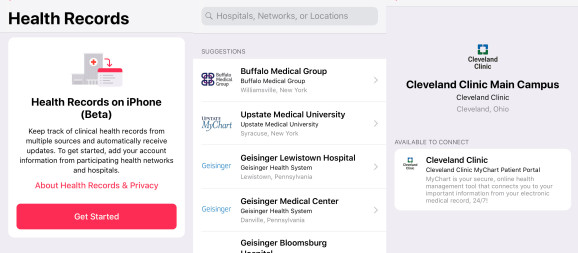Above: Health Records on the beta release of iOS 12 for the iPhone.
Image Credit: Jeremy Horwitz/VentureBeat
JEREMY HORWITZ@HORWITZ
Source: venturebeat.com, January 2019
Over the last five years, Apple’s move into health-related products and services has been cautious but unmistakable, starting with the debut of the Apple Watch and continuing with everything from HealthKit medical studies to an iPhone Health Records feature. Now a small survey by the University of California at San Diego is quantifying how early users of Health Records are liking the feature, and the answer is generally — though not completely — positive.
Published by medical journal JAMA, the survey asked three questions: whether the user could easily connect their mobile device to the platform; was satisfied using the feature; and felt that it either improved their understanding of their own health, facilitated conversations with clinicians, or improved sharing of personal health information with friends and family. While the vast majority of respondents said yes to each question — 96 percent to ease of connectivity, 78 percent satisfaction, and 90 percent on qualitative improvements — JAMA reports that only 48 percent of respondents said all three areas had improved.
On the one hand, the latter number is hard to understand: Under half of all respondents said they saw improvements across the board, and user satisfaction with the Apple Health Records feature appears to be the weakest of the links. But viewed another way, Health Records looks to offer clear improvement over the status quo, giving most users an easy way to access and understand their health records, which were all but locked away in doctors’ files until now.
With surveys of this sort, there’s always a question of how possible it is generalize the results to the wider public, and the population in this sample was small. The anonymous survey was sent to only the first 425 UC San Diego Health patients to activate Health Record, and the percentages above were based on only 132 survey responses. By survey standards, that’s generally not enough to draw broader conclusions, but JAMA reports that it represents a significant subset of the “hundreds of personal health record users who have downloaded thousands of clinical results and other pieces of medical information though the platform” at UC San Diego Health, as of fall 2018.
Apple has generally offered two updates on the progress of its health initiatives each year, and there’s been a low but steady buzz about the health records feature over the last year. Though one of the earliest adopters suggested it might be overhyped and needs both more data and greater portability, reports elsewhere have been more positive. Apple added additional health functionalityto the Apple Watch Series 4 and will likely announce new features for both iOS and its watches throughout 2019.

